The electronics industry has long been complaining about the growing shortage of skilled workers. There is a demand in virtually every area. Apprentices are rare and sought-after, and the shortage is also evident at technical colleges and universities - for example in the field of engineering. There is no lack of offers and commitment from companies, schools and trainers, or studies on this pressing issue. So what needs to be done? Time to take stock.
The complaints are not new, of course. As early as 2010, the then VDMA President Thomas Lindern warned that the shortage of skilled workers could set back key German industries such as mechanical engineering. The supply of skilled workers would become a limiting factor for the industry - and the same applied to research and development, warned Lindner [1].
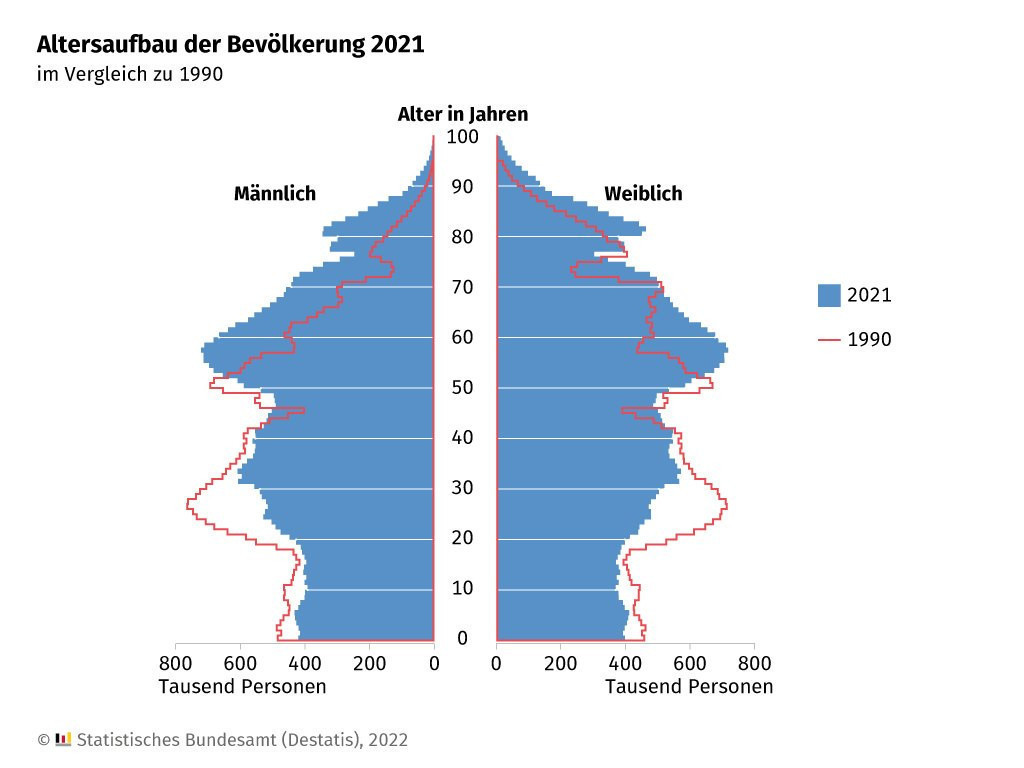 More Christmas tree than pyramid: demographic change in Germany (age structure of the population in 2021)
More Christmas tree than pyramid: demographic change in Germany (age structure of the population in 2021)
He was proved right. In 2023, the situation will be more pressing than ever. There will be a shortage of skilled workers in industry and the skilled trades, and even unskilled and logistics workers will be scarce [2]. A study commissioned by the Federation of German Industries (BDI) and the German Electrical and Electronic Manufacturers' Association (ZVEI) has just revealed that there is an annual average shortage of around 62,000 skilled workers in professions that should be employed in the semiconductor industry, for example [3] - and this in times of the planned and politically desired 'reshoring'. According to ZVEI President Gunther Kegel, the shortage of skilled workers is also jeopardizing the necessary "digital and green transformation" [4].
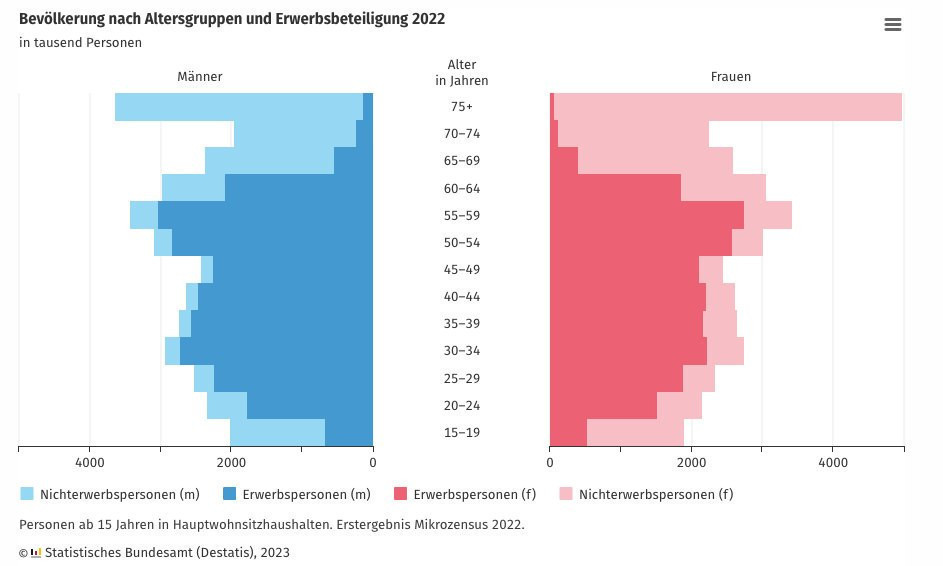 At 87%, the labor force participation rate among 25 to 59-year-olds was already at a very high level in 2022 - a clear statistical finding that the labor pool in Germany has largely been exhausted
At 87%, the labor force participation rate among 25 to 59-year-olds was already at a very high level in 2022 - a clear statistical finding that the labor pool in Germany has largely been exhausted
But what are the reasons? For Mirko Wesling from the German Confederation of Skilled Crafts (ZDH), the main reason is clear: "The elephant in the room is, of course, demographics," Wesling said in a podcast by the Federal Statistical Office (DeStasis) [5, 6]. The number of young people has fallen significantly in recent years, and this is reflected in the demand for apprenticeships. In terms of education policy, the focus in recent decades has been on academic education, while there is still no comprehensive vocational orientation at general education schools about career opportunities with a vocational education.
Uncertain data situation
 In the electronics industry, skilled workers are rare and sought-after - and increasingly sought-after and competitiveSurveysconducted by the Leibniz Institute for Economic Research at the University of Munich (ifo)alsorevealed that almost 50% of companies are restricted by a shortage of skilled workers [7]. The authors of ifo Viewpoint No. 243 pointed out that this would also apply to countries with a more favorable demographic structure - such as the USA. PLUS columnist Dr. Hayao Nakahara reports the same from Southeast Asia, e.g. Malaysia, where companies in the up-and-coming PCB industry have to poach skilled workers from each other [8].
In the electronics industry, skilled workers are rare and sought-after - and increasingly sought-after and competitiveSurveysconducted by the Leibniz Institute for Economic Research at the University of Munich (ifo)alsorevealed that almost 50% of companies are restricted by a shortage of skilled workers [7]. The authors of ifo Viewpoint No. 243 pointed out that this would also apply to countries with a more favorable demographic structure - such as the USA. PLUS columnist Dr. Hayao Nakahara reports the same from Southeast Asia, e.g. Malaysia, where companies in the up-and-coming PCB industry have to poach skilled workers from each other [8].
According to Clemens Fuest (ifo) and Simon Jäger (Institute of Labor Economics, IZA), the solution is obvious: the shortage can only be countered by higher wages. This would lead to some companies withdrawing from the market and some "unpleasant activities being eliminated or automated". However, there would be a gain for the economy as a whole, as people would be more willing to accept a job if wages were higher. In any case, the result would be rising prices and stronger competition - but this would ultimately help to combat the shortage of skilled workers [7].
Prof. Dr. Wenzel Matiaske from the Helmut Schmidt University of the Federal Armed Forces in Hamburg (HSU), whom we interviewed for our 'Interview of the Month', takes a more nuanced view.
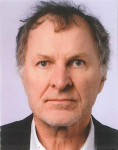 Dr. Wenzel MatiaskeMatiaskeheads the long-term study 'Companies and Corporate Working Environments in Germany', which is being conducted on behalf of the German Institute for Economic Research (DIW Berlin) and in cooperation with the Helmut Schmidt University Hamburg (HSU) [9]. It examines changes in the world of work as a result of technological change and aims to create a data-based scientific foundation for political decisions on the extent to which requirements for further training, working time models and places of work are changing or need to change. There are many suggestions for this: More attractive working conditions such as a four-day week while productivity remains the same or even increases, more family-friendly working hours and higher wages. According to Matiaske, however, the general effectiveness of these measures is "doubtful" [10]. He told the PLUS that it depends on "whether the specific group of employees responds to higher pay or shorter working hours or what kind of working conditions are seen as attractive." Individualization is a keyword that sociological research uses to describe our society, and it "increasingly implies for HR management that a variety of needs are associated with gainful employment and must be taken into account from an operational perspective when there is a reduced supply of work." In his opinion, companies are not at a loss as to how to counter the shortage of skilled workers: "Company practitioners know their situation and are resourceful in generating solutions. However, this resourcefulness is needed." The escalation in the current year 2023 is also a "lingering effect of the coronavirus crisis". Measures to recruit staff, i.e. to cover replacement requirements or even increase staffing levels, have been postponed. This is also reflected in the survey results of the long-term study.
Dr. Wenzel MatiaskeMatiaskeheads the long-term study 'Companies and Corporate Working Environments in Germany', which is being conducted on behalf of the German Institute for Economic Research (DIW Berlin) and in cooperation with the Helmut Schmidt University Hamburg (HSU) [9]. It examines changes in the world of work as a result of technological change and aims to create a data-based scientific foundation for political decisions on the extent to which requirements for further training, working time models and places of work are changing or need to change. There are many suggestions for this: More attractive working conditions such as a four-day week while productivity remains the same or even increases, more family-friendly working hours and higher wages. According to Matiaske, however, the general effectiveness of these measures is "doubtful" [10]. He told the PLUS that it depends on "whether the specific group of employees responds to higher pay or shorter working hours or what kind of working conditions are seen as attractive." Individualization is a keyword that sociological research uses to describe our society, and it "increasingly implies for HR management that a variety of needs are associated with gainful employment and must be taken into account from an operational perspective when there is a reduced supply of work." In his opinion, companies are not at a loss as to how to counter the shortage of skilled workers: "Company practitioners know their situation and are resourceful in generating solutions. However, this resourcefulness is needed." The escalation in the current year 2023 is also a "lingering effect of the coronavirus crisis". Measures to recruit staff, i.e. to cover replacement requirements or even increase staffing levels, have been postponed. This is also reflected in the survey results of the long-term study.
Meeting the shortage creatively
 A future electronics specialist at work; Image: AdobeStockWhilethe shortage of skilled workers is a fact, there can hardly be any talk of a lack of resourcefulness. Companies and associations, schools, universities and technical colleges have been working on the topic for years and offer events for various target groups: For girls ('Girls' days') and boys ('Boys' days') of school age, potential trainees after leaving school, those interested in studying electronics or dual study concepts. However, the time and financial resources for these programs are limited and the results are not always convincing. According to representatives of the PCB industry, it often seems like tilting at windmills.
A future electronics specialist at work; Image: AdobeStockWhilethe shortage of skilled workers is a fact, there can hardly be any talk of a lack of resourcefulness. Companies and associations, schools, universities and technical colleges have been working on the topic for years and offer events for various target groups: For girls ('Girls' days') and boys ('Boys' days') of school age, potential trainees after leaving school, those interested in studying electronics or dual study concepts. However, the time and financial resources for these programs are limited and the results are not always convincing. According to representatives of the PCB industry, it often seems like tilting at windmills.
One example of this is the company Hannusch Industrieelektronik from Laichingen near Ulm in Baden-Württemberg [11]. It is very active in promoting young talent - with a particular focus on girls and women [12]. Claudia Hannusch, authorized signatory and until recently CEO of the family business, has not forgotten the rocky road that awaited her when she entered the 'technical world of men'. Accordingly, she is still committed to introducing girls to industrial electronics at an early age. Hannusch Industrieelektronik maintains educational partnerships under the direction of the Ulm Chamber of Industry and Commerce, for example with the Anne-Frank-Realschule, the Erich-Kästner-Gesamtschule and the Albert-Schweitzer-Gymasium in Laichingen. Contacts also exist with the elementary school in Feldstetten and the Blautopf elementary school in Blaubeuren. Hannusch Industrieelektronik has also founded the training association 'Löttechnik Elektronik' (AVLE) together with the companies Rafi, Zollner and Ersa and in cooperation with the FED trade association in order to improve the quality, reliability and reproducibility of hand soldering joints [13]. AVLE offers seminars and training programs lasting several days at the headquarters of the participating companies.
 Clauda Hannusch, Hannusch IndustrieelektronikIn order toappeal to young people - especially females - the company organizes 'Technology Days' for schools in Laichingen, as well as 'Girls Days' and 'Hand Soldering Taster Courses'. However, according to Claudia Hannusch, the results are mixed. In a personal conversation with the PLUS, she complains that too few female participants opt for an apprenticeship - and stay on the ball. However, this is not the fault of the open-minded young people. In addition to 'local' difficulties in rural areas, where local public transport is often too weak to guarantee a safe and reliable journey for trainees, Claudia Hannusch identifies problems with the parents' generation. Their support is either insufficient - or, on the contrary, too "helicopter-like". They often forget to encourage young people to be independent. Yet it is part of growing up - especially for a successful apprenticeship - to present oneself to companies with one's own skills, to organize travel to and from work and to learn the basics of the working world. Hannusch therefore thinks little of 'baiting' young people with offers such as tablets or an electric car as a company vehicle. She is very happy to support training - including that of working students, who are even more difficult to recruit for a company in rural areas - and does not leave young people hanging in difficult phases. However, her company attaches great importance to independence, and parents also have a duty here. However, Claudia Hannusch, who is usually quick-witted, is at a loss as to how to better reach and address them.
Clauda Hannusch, Hannusch IndustrieelektronikIn order toappeal to young people - especially females - the company organizes 'Technology Days' for schools in Laichingen, as well as 'Girls Days' and 'Hand Soldering Taster Courses'. However, according to Claudia Hannusch, the results are mixed. In a personal conversation with the PLUS, she complains that too few female participants opt for an apprenticeship - and stay on the ball. However, this is not the fault of the open-minded young people. In addition to 'local' difficulties in rural areas, where local public transport is often too weak to guarantee a safe and reliable journey for trainees, Claudia Hannusch identifies problems with the parents' generation. Their support is either insufficient - or, on the contrary, too "helicopter-like". They often forget to encourage young people to be independent. Yet it is part of growing up - especially for a successful apprenticeship - to present oneself to companies with one's own skills, to organize travel to and from work and to learn the basics of the working world. Hannusch therefore thinks little of 'baiting' young people with offers such as tablets or an electric car as a company vehicle. She is very happy to support training - including that of working students, who are even more difficult to recruit for a company in rural areas - and does not leave young people hanging in difficult phases. However, her company attaches great importance to independence, and parents also have a duty here. However, Claudia Hannusch, who is usually quick-witted, is at a loss as to how to better reach and address them.
Public transport as a decisive factor
One school that has long been associated with Hannusch is the Anne-Frank-Realschule in Laichingen [14]. It has been working with companies and craft businesses for years to show pupils the way to an internship or apprenticeship. An educational cooperation with the company Rehm Thermal Systems in Blaubeuren [15] has also recently been established. According to Vice Principal Eva Grech, who is in charge of career guidance, Rehm approached the secondary school itself. Previously, the pupils and parents had not been aware of the company - one reason for this was the poor connections in the rural area between Laichingen and Blaubeuren, 15 km away.
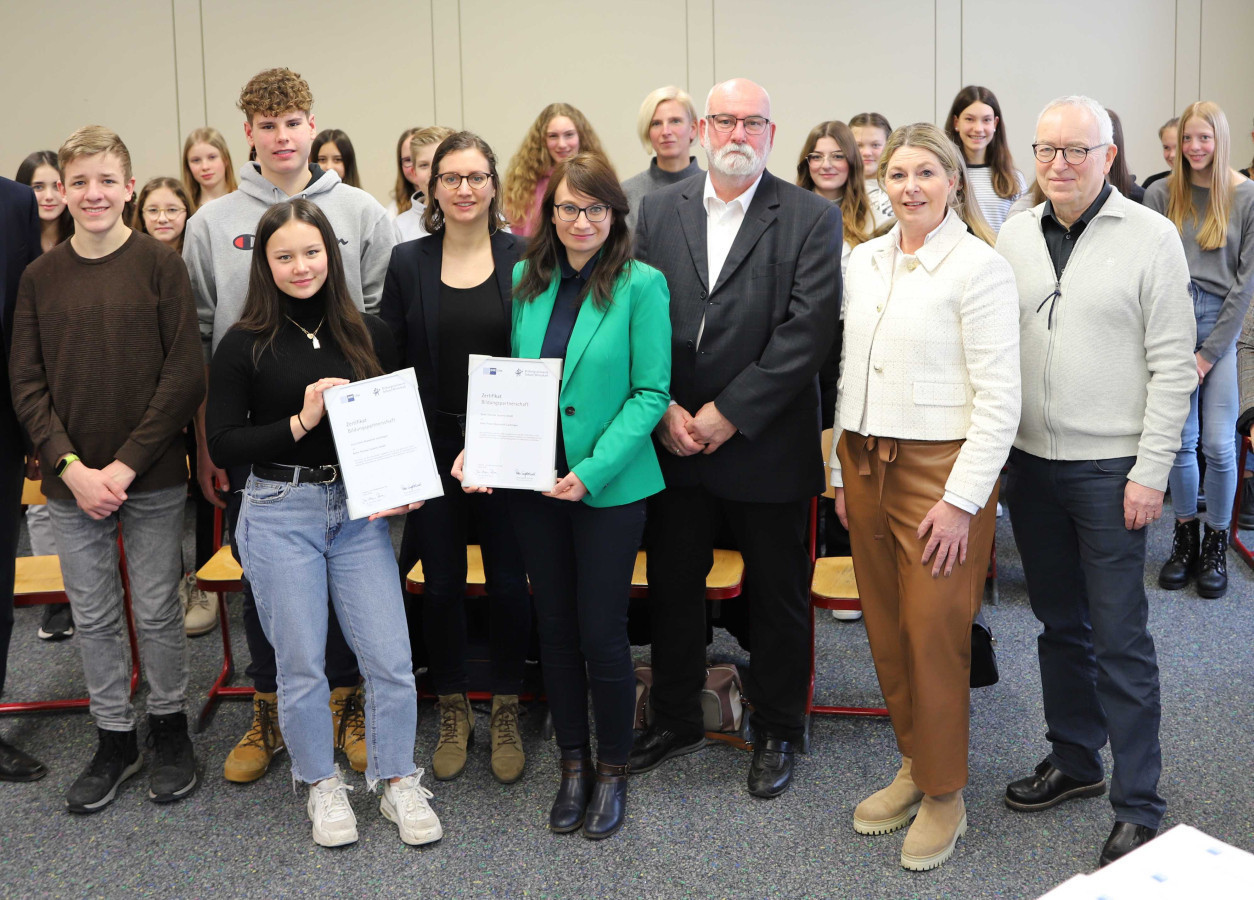 Eighth grade students at the secondary school in Laichingen signing an educational partnership with Rehm Thermal Systems
Eighth grade students at the secondary school in Laichingen signing an educational partnership with Rehm Thermal Systems
In order to facilitate internships (and the resulting training options), the school and company are thinking about organizing a transport service. According to Ms. Grech, public transport is a decisive factor in the success of such collaborations.
Apart from that, 80-90% of the success depends on the parents. Grech also sees worrying developments in the parents' generation. Many are unable to take sufficient care of their children's education due to their own professional concerns. This is particularly difficult for families with a migration background. Grech also sees the problem of "helicopter or lawnmower parents" who find it difficult to let their children go off on their own. Both phenomena in combination make the path to education more difficult.
The pupils themselves are all interested in making contact with companies such as Hannusch and Rehm and would gladly accept the offers. However, they are surprisingly well informed about the shortage of skilled workers: they know only too well that they can get an apprenticeship without any problems and are "correspondingly chilled." But they also know one thing: that they don't want to become 'workaholics' later on, like their parents. Accordingly, they carefully examine training offers, talk to each other - including on social media - and are more willing to "change horses" if they encounter obstacles.
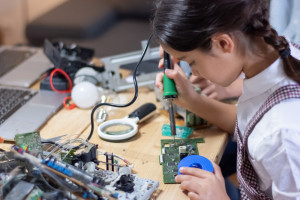 Schoolchild soldering wires and circuit boards as part of an electronics course for children in the laboratory; Image: AdobeStockAccordingto Ms. Grech, there are fundamental factors that contribute to a worsening of the situation. On the one hand, there are simply fewer pupils than before. On the other hand, the merging of Hauptschule and Realschule has had a negative impact. The competence for training orientation lay with the Hauptschule - there were no corresponding programs for Realschulen. This competence was lost due to the greatly reduced attractiveness of Hauptschulen and the merging with Realschulen. In some cases, the secondary modern schools had to familiarize themselves with the subject from scratch.
Schoolchild soldering wires and circuit boards as part of an electronics course for children in the laboratory; Image: AdobeStockAccordingto Ms. Grech, there are fundamental factors that contribute to a worsening of the situation. On the one hand, there are simply fewer pupils than before. On the other hand, the merging of Hauptschule and Realschule has had a negative impact. The competence for training orientation lay with the Hauptschule - there were no corresponding programs for Realschulen. This competence was lost due to the greatly reduced attractiveness of Hauptschulen and the merging with Realschulen. In some cases, the secondary modern schools had to familiarize themselves with the subject from scratch.
When asked by the PLUS what else companies could do to fill more training places, Ms. Grech recommended a stronger focus on social media, which pupils are really aware of and use. They also respond best to younger faces at training days. The company Rehm has implemented this in an exemplary manner: Here, pupils would deliberately come into contact with trainees and younger training managers. This has been very well received. And, of course, a greater commitment on the part of companies to the expansion of local public transport makes sense. For example, a new train stop in nearby Merklingen has had an extremely positive effect on the promotion of training in Laichingen [16].
What do children themselves think about offers from companies to attract interns and trainees? During our research, we interviewed two schoolgirls from Rhineland-Palatinate [17]. One of them took part in a 'Girls' Day' at the age of 13, during which she visited craft businesses and companies. Her sister, who is four years younger, is due to attend such a 'Girls' day' in the coming school year.
The first-named pupil, who is now 16 years old, is more critical in retrospect. For her and her classmates, the 'Girls' Day' would have been uninteresting - "the main thing was to have a day off school" (quote). When asked about the reasons for this, she said that in her opinion the instructors were far too old and told and showed uninteresting details. She would have hoped for more contact with younger trainees and younger trainers. Both she and her sister suggest offering such 'Girls' Days' much earlier - i.e. for younger pupils: Between the ages of 8 and 10, they both always wished they had been able to 'get a taste' of the world of work.
Intermezzo: The beginning of research
Our research does not end with the basic examination of the above-mentioned studies and the survey of companies, schools and pupils - it is just beginning. The initial discussions have already shown that the shortage of skilled workers cannot be fully explained with reference to demographic change alone. Various factors seem to be intertwined - political, social, cultural and technological. As a trade journal, we are of course unable to provide an explanation - but what we can do through our contacts (and simply through journalistic research) is to attempt to take stock of this complex issue.
The plan at the beginning of the project was to conduct comprehensive interviews with as many different stakeholders as possible: From academics and politicians, trainers and trainees, professors and students ... but also drop-outs from a course of study or training. The declared aim of this research is to paint a comprehensive picture of the current situation. The interviews we report on below can therefore only be a prelude. After all, each one sheds new light on the problem - and has sparked our interest in delving deeper into the shortage of skilled workers in the electronics industry and research.
So, after this brief interlude, let's get started and take a closer look at other interviewees on our journey through the jungle of the skills shortage.
"Every new year has to be won over"
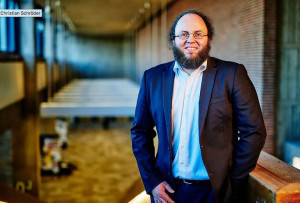 Christian Schröder, Vice President for Studiesand Teaching, Teacher Training and Continuing Educationat Technische Universität BerlinWe were able to talk to Christian Schröder, Vice President for Studies and Teaching, Teacher Training and Continuing Education at Technische Universität Berlin. Schröder also notes a shortage of specialists "in almost all" areas. He drew particular attention to the shortage of teachers in the technical field (physics, chemistry), which is having an increasing impact. This is therefore also a political problem. Schröder does not see a decline in the number of students themselves - but the demand has grown enormously. This is why the approach to young people must be improved: "Every STEM year must be won over." And that is also possible: Schröder often hears applicants say things like "We want to help shape the energy transition - what training can I use to do that?". This range of topics appeals to many interested parties - and TU Berlin is responding to this. "We tell young people: You want to study sustainability? You can do it here."
Christian Schröder, Vice President for Studiesand Teaching, Teacher Training and Continuing Educationat Technische Universität BerlinWe were able to talk to Christian Schröder, Vice President for Studies and Teaching, Teacher Training and Continuing Education at Technische Universität Berlin. Schröder also notes a shortage of specialists "in almost all" areas. He drew particular attention to the shortage of teachers in the technical field (physics, chemistry), which is having an increasing impact. This is therefore also a political problem. Schröder does not see a decline in the number of students themselves - but the demand has grown enormously. This is why the approach to young people must be improved: "Every STEM year must be won over." And that is also possible: Schröder often hears applicants say things like "We want to help shape the energy transition - what training can I use to do that?". This range of topics appeals to many interested parties - and TU Berlin is responding to this. "We tell young people: You want to study sustainability? You can do it here."
One example is the 'MINTgrün' orientation course [18]. Students take part in university courses in mathematics, computer science, natural sciences and technology for two semesters and sit exams. They deepen their knowledge in special MINTgrün tutorials and put it into practice in the project labs. In this way, they learn about different questions, working techniques and methods from STEM subjects. In the Science Window module, they deal with current research topics from a sustainability perspective. In the end, this helps them to make an informed decision about their choice of studies - and the work they have done in the MINTgrün orientation year can be credited. "This is very well received," says Schröder happily.
In order to arouse pupils' interest in STEM subjects, TU Berlin cooperates with schools in Berlin and Brandenburg. For example, 'dEIn Labor' is an electrical engineering and computer science laboratory for school students at Faculty IV (Electrical Engineering and Computer Science), where curious students can try things out [19]. However, when asked by PLUS, Schröder had to admit that success is difficult to measure. In surveys of graduates, it was determined whether they were aware of such student labs before starting their studies and whether this experience might have influenced their decision to study. The sobering 'success rate' was only in the single-digit percentage range.
All for nothing? Christian Schröder sees things differently: "If we didn't offer something like this, everything would be even worse." In this context, he points out a decisive factor: The family probably has the greatest influence on the choice of studies and career - just as Claudia Hannusch and Eva Grech report.
Young founders in the focus of interest
 Dr. Andreas Krauß; Image: Eberhard Karls University of TübingenAninsightful conversation took place with Dr. Andreas Krauß, who is responsible for the Start-up Center innovation lab at the Eberhard Karls University of Tübingen [20]. The University of Tübingen promotes the transfer of technology into application and utilization and supports students as well as researchers, employees and alumni in their attempts to turn innovative ideas and projects into successful start-ups with the Start-up Center. Dr. Krauß and his team also offer workshops on product and prototype development, including CAD design, laser cutters and 3D printing, embedded computing systems and PCB development [21].
Dr. Andreas Krauß; Image: Eberhard Karls University of TübingenAninsightful conversation took place with Dr. Andreas Krauß, who is responsible for the Start-up Center innovation lab at the Eberhard Karls University of Tübingen [20]. The University of Tübingen promotes the transfer of technology into application and utilization and supports students as well as researchers, employees and alumni in their attempts to turn innovative ideas and projects into successful start-ups with the Start-up Center. Dr. Krauß and his team also offer workshops on product and prototype development, including CAD design, laser cutters and 3D printing, embedded computing systems and PCB development [21].
Dr. Krauß is thus familiar with a phase in the training cycle of young people that has rarely been considered to date - shortly before and shortly after their academic degree and at the start of their professional careers. Half of the founders he supervises come from the natural sciences and computer science, 20% from medicine - and a remarkable 30% from the humanities. As career changers, they first had to acquire the technical prerequisites, but they were highly committed.
When asked about the shortage of skilled workers in the electronics industry and research, Dr. Krauß confirms many of the statements made in our research. He sees the problem of an "enormously high level of complexity" in engineering courses, simply due to the rapid pace of technical progress. The sheer volume of course content is often a deterrent for students. In addition, the reduction in the number of years of secondary schooling to just eight is having a negative impact. Universities have to "retrain" accordingly - at a time when there is not only a shortage of specialists but also a shortage of teachers. As a result, school lessons are being missed and the media skills of active teachers are often poor - and consequently also those of the pupils. Dr. Krauß also recognizes that there is a lack of practical relevance and that the parents' generation is less able to pay attention to their children's education due to social hardship. All of this contributes to a worsening of the shortage of skilled workers. This is because there is no lack of "offers, not even the approach". However, university education must recognize "that the framework conditions have changed" [22].
There is a lack of practical relevance
We also interviewed Sven Gramatke, electroplating engineer at Leuze-Verlag, who also works as an editor for our parent magazine 'Galvanotechnik' (GT). In the course of his training and further education at the industrial school in Schwäbisch Gmünd, he also came into contact with PCB production [23].
His opinion is in line with Dr. Krauß' findings: electrical engineering has become so complicated that trainees are finding it increasingly difficult to grasp the material. The ability to abstract is lost in the face of complexity. Gramatke recommends placing greater emphasis on physical and chemical fundamentals instead of stubborn memorization, dispensing with theoretical ballast and focusing more on practice. The classic four-step method ('demonstration' by the trainers, 'imitation' by the trainees) [24] is often the best way to approach content - but it is too rarely used by trainers. Gramatke also refers to motivational techniques that could be used to get young people interested in such professions - keyword: social media.
What do students themselves say?
In an interview with the student council of the Faculty of Electrical Engineering and Information Technology [25] at the Karlsruhe Institute of Technology (KIT) [26], the situation is also seen as bleak: "It doesn't look good." There has been a sharp drop in student numbers. The student council is working against this and trying to attract new students. However, electrical engineering has an image problem. Its content is hard to grasp, the course is considered difficult: "It gets very tricky very quickly." There is often no common thread. As a result, many students choose a - supposedly - easier course.
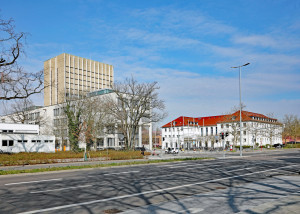 University of Karlsruhe; Image: Klaus Epple/AdobeStock
University of Karlsruhe; Image: Klaus Epple/AdobeStock
"Some of the teaching methods lag behind the times"
Interview with a student from the Electrical Engineering and Information Technology student council at the Karlsruhe Institute of Technology [*]
Why did you choose to study electrical engineering and information technology?
Wide range of job opportunities, high degree of specialization possible, maximum job security. As long as there is electricity, there are jobs (and when there is no electricity we have other worries), the prospect of generous remuneration in a persistently tense overall economic situation.
When did you first become interested in this area?
Shortly after leaving school, after a short period of employment in a craft business. There, I took on basic electrician tasks and installed smart home applications. That made me want to learn more.
What profession or position are you aiming for?
Development engineer/team leader
How have you found your education at KIT so far in terms of the amount of material, complexity and knowledge transfer?
It's a lot. And it's not always easy to assign (especially at the beginning of the course). Some of the teaching methods lag behind the times. There are no uniform teaching standards and the enthusiasm of the professors to 'control' each other is limited due to the 'freedom of teaching'. In addition, it can be said that the majority of lecturers are generally very motivated, but unfortunately also hopelessly overworked. The institutes generally lack support. There is a lack of funds for the adequate employment of administrative staff and for permanent employment contracts. This is not even mainly due to the faculty or university, but is a state or nationwide problem.
In your opinion, what needs to be improved in electronics education?
Clearer communication about the opportunities that are opened up by this degree, a handy presentation of available fields of work and a clear list of how work can be done to improve the environment and society with the skills acquired here.
Do you know any fellow students who have dropped out and their reasons for doing so?
Overwork, inadequate support, overburdened by having to finance their own studies in addition to the very demanding course. The rules for BaFöG are very strict - apart from Covid-19. With a standard period of study of six semesters - after which state support is suspended - and an average duration of study for a Bachelor's degree of between eight and nine semesters, you inevitably have to work unless you come from a financially secure parental home.
In your opinion, what are the main reasons for the shortage of skilled workers in the electronics industry and research?
It is the sum of low enrolment figures due to the image problems mentioned and the strenuous studies with high drop-out rates along the way.
Reference
[*] Our interviewee wishes to remain anonymous.
"The shortage of skilled workers is not an isolated problem in the electrical industry"
Interview with Max Mönikes, Master's student of electrical engineering at the Technical University of Berlin
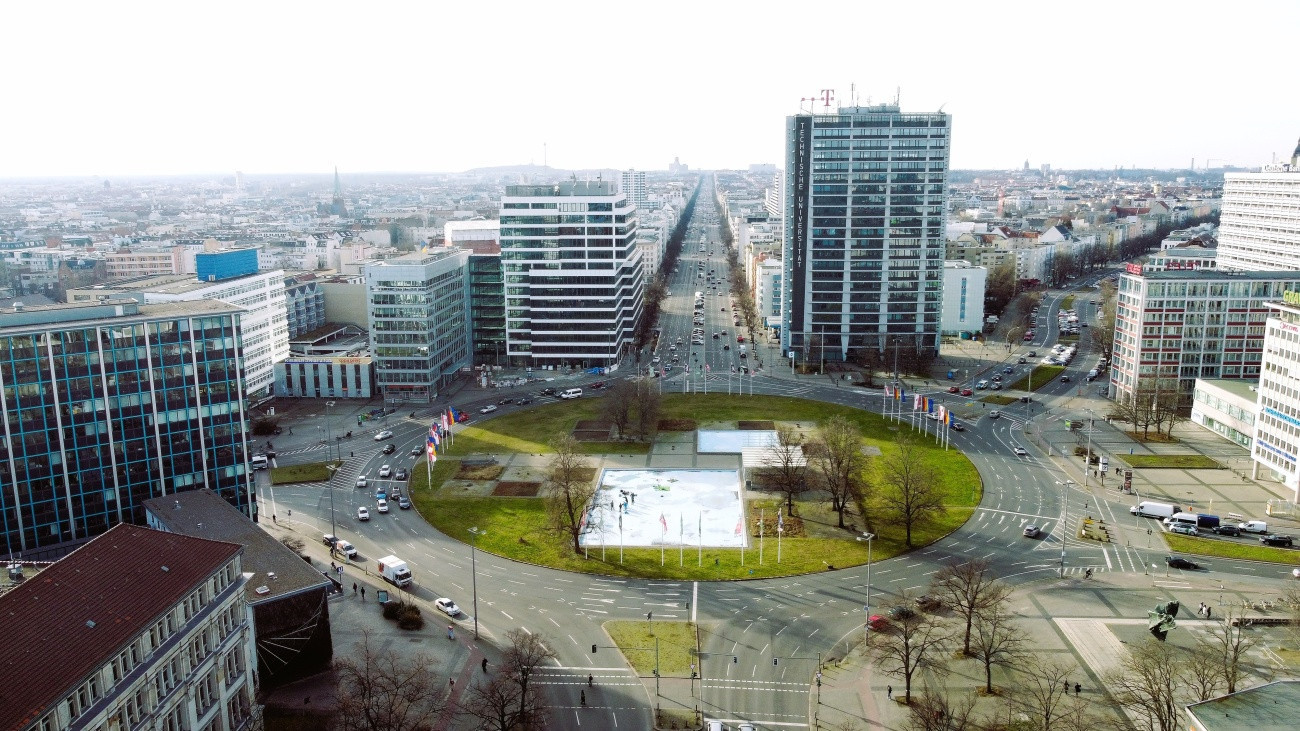 Ernst-Reuter-Platz in Berlin: The various institutes of the Technical University are located here in a wide area; Image: AdobeStock
Ernst-Reuter-Platz in Berlin: The various institutes of the Technical University are located here in a wide area; Image: AdobeStock
Why did you choose this particular course of study?
Nowadays, electrical devices are indispensable in almost every field. Studying electrical engineering gives you a comprehensive insight into how the technology that surrounds us works and gives you the opportunity to play an active role in its future development. The course is also very versatile and offers the opportunity to work in a wide variety of professions later on.
How long have you been interested in this field?
I have been interested in technology since I was a child and came into contact with computers quite early on through my parents. Through computer science, I became interested in microcontrollers (Arduino) in high school, which led to an interest in electrical engineering/electronics.
What career or position are you aiming for?
After graduating, I would initially like to work as a hardware developer in the field of circuit board design and layout.
How have you found your university education so far in terms of the amount of material, complexity and knowledge transfer?
The amount of material covered during the bachelor's degree is relatively high and the modules are not always well coordinated in terms of workload. Electrical engineering is justifiably one of the more complex courses with a comparatively high proportion of mathematics. On the other hand, you get a good overview of most sub-areas and in-depth theoretical foundations. The Master's degree, on the other hand, is much more project-oriented and attempts to apply the knowledge acquired in the Bachelor's degree. At the same time, it is possible to specialize in many areas and look beyond the boundaries of electrical engineering, for example by taking modules on the environmental impact of electronic devices.
In your opinion, what needs to be improved in university education in the field of electronics?
The proportion of practical work during the Bachelor's degree course is quite low, at least at my university. Of course, this is due to the relatively large amount of material, but it quickly leads to a lack of an idea of why you have to learn something. On the one hand, this can quickly lead to frustration, but on the other, it encourages learning for the exam rather than a lasting understanding.
Do you know any fellow students who have dropped out of university and their reasons for doing so?
I personally don't know anyone who has dropped out, but many who decided to do a different Master's/second Bachelor's degree after their Bachelor's, such as medical engineering or mathematics.
In your opinion, what are the main reasons for the shortage of skilled workers in the electronics industry and research?
First of all, the shortage of skilled workers is not an isolated problem in the electronics industry, but in the entire sector. In my opinion, the electrical industry also has a large overlap with computer science, i.e. people who might have studied electrical engineering study computer science and vice versa. This results in a smaller pool of potential new skilled workers, which, in addition to demographic change and strong growth in both industries over the last few decades, favors a shortage of skilled workers.
New concepts for the 'trainee day'
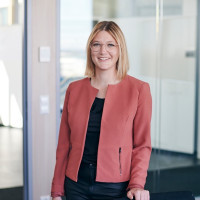 Jana Brielmayer, Head of Training at RafiJanaBrielmayer, Head of Training at Rafi in Berg (near Ravensburg) in Baden-Württemberg, reports on her experiences in the search for new trainees [27]. Rafi, a major EMS service provider in the DACH region and supplier of HMI platforms, has a total of eight locations, six of them in Europe and one each in the USA and China. In Germany, Rafi is very active in vocational training and - like Hannusch - is involved in the AVLE training association [13]. Ms Brielmayer recently organized another Rafi Trainee Day on 12 April 2023. This had taken place for the first time in 2022, on a much larger scale as an 'open day'. However, this did not meet with the desired response. Despite the large number of visitors, only a few people contacted Rafi afterwards.
Jana Brielmayer, Head of Training at RafiJanaBrielmayer, Head of Training at Rafi in Berg (near Ravensburg) in Baden-Württemberg, reports on her experiences in the search for new trainees [27]. Rafi, a major EMS service provider in the DACH region and supplier of HMI platforms, has a total of eight locations, six of them in Europe and one each in the USA and China. In Germany, Rafi is very active in vocational training and - like Hannusch - is involved in the AVLE training association [13]. Ms Brielmayer recently organized another Rafi Trainee Day on 12 April 2023. This had taken place for the first time in 2022, on a much larger scale as an 'open day'. However, this did not meet with the desired response. Despite the large number of visitors, only a few people contacted Rafi afterwards.
The company therefore opted for a new, deliberately reduced concept: "only" company tours were offered, organized by a small team, with three trainees themselves presenting their profession. Nine people showed interest - but there had already been several responses from this comparatively small group. In this respect, Ms. Brielmayer feels vindicated. The new concept is now being tested more frequently, with the next meeting scheduled for the end of July.
In total, Rafi offers training for 18 different professions and cooperates with ten different schools, the Meckenbeuren training center and the Ravensburg-Weingarten University of Applied Sciences. In this cooperation, Rafi was looking for trainees and working students - with success! The drop-out rate is low (only around one person per year). However, Brielmayer also recognizes a theoretical overload in the studies. Even though Rafi tries to support the working students when they have problems, this is a general problem. According to Brielmayer, a more practice-oriented course would be helpful.
 Working student at Rafi
Working student at Rafi
Interview with Philip Arnold
What profession exactly are you being trained for at RAFI?
Bachelor of Embedded Systems Engineering - Automotive Engineering
Why exactly did you choose this training/study program?
Because I am just as interested in electronic circuits as I am in programming.
When did you become interested in this field?
I've always enjoyed technology. I would name my father as the person responsible for this.
father. Through him, I've always had contact with electronics and software.
What profession or position do you aspire to?
After successfully completing my studies, my goal is to work in the development department at Rafi.
How have you found your training at RAFI so far in terms of the amount of material, complexity and knowledge transfer?
As I am on a dual study program, the workload is higher. Particularly in the theoretical phases of the course, you are taught a lot of complex material in a short space of time, as a semester only lasts three months. However, it is important to build up this knowledge base, and it is all the better if you can directly apply and benefit from your theoretical knowledge in the practical phase in the company.
In your opinion, what needs to be improved in electronics training?
In my studies, I have to deal with both electronics content and computer science, so I am not a pure electronics engineer. From my perspective, I can only see that electronics is lagging behind computer science, especially in its application at university.
Do you know any trainees or students who have dropped out of training and their reasons for doing so?
The number of my fellow students has decreased by about a quarter over the last few semesters. For most of them, the problem was that they didn't keep up.
In your opinion, what are the main reasons for the shortage of skilled workers in the electronics industry and research?
Older specialists are retiring and there aren't enough young people to fill the vacancies - at least that's what I was told at school.
Complex situation
As mentioned, the above interviews are intended as the starting point for a longer journalistic investigation that we would like to continue in the PLUS. Various factors are already emerging that may exacerbate the shortage of skilled workers and that have not been discussed - or have been discussed too little - to date. It is remarkable that our interviewees come to similar conclusions from different perspectives - be it positions on the complexity of university and practical training, on the ideal way to address young people, on the apparently underestimated importance of public transport for this problem, on the effects of school concepts such as G8, on the growing interest of young people in sustainability issues or on the still decisive influence of the parents' generation. It is worth pursuing many of these starting points further.
For this reason, our research will continue - hopefully further discussions can be held and evaluated as the year progresses. We also want to follow up on ongoing studies such as those conducted by HSU Hamburg and DIW Berlin under the direction of Prof. Wenzel Matiaske. Accordingly, the final word of this extensive article belongs to him: As a general hypothesis on the subject of skills shortages, he formulates that "older concepts of educational expansion and lifelong learning continue to endure and require ongoing reformation." The incremental process of digitalization in production and increasingly in the service sector in particular "still holds a lot of potential for rationalization, which goes hand in hand with new demands on human labour." According to Matiaske, it is no longer possible to say with any certainty what these will look like in concrete terms. This requires very specific knowledge of the production conditions in the respective sector - especially in the electronics industry.
References
[1] Lutz Reiche: Mechanical engineering women wanted due to skills shortage, Manager-Magazin, 2.11.2010 (Retrieved: 4.5.2023)
[2] In an interview with PLUS, Uwe Veres-Homm from the Fraunhofer Institute for Integrated Circuits (IIS) pointed out that there was also a shortage of workers in logistics and that the industry as a whole needed to change and become more flexible: "Who else is going to be doing this work in ten years' time when the baby boomers retire?" Cf. the PLUS, issue 3/2023, 363
[3] PLUS, issue 4/2023, p. 468
[4] Ibid.
[5] www.destatis.de/DE/Presse/Pressemitteilungen/2022/11/PD22_N068_p001.html (accessed: 3.5.2023)
[6] Podcast episode from 19.01.2023: www.destatis.de/DE/Mediathek/Podcasts/_inhalt.html (accessed: 3.5.2023)
[7] Cf. Clemens Fuest; Simon Jäger: Can higher wages help overcome the shortage of skilled workers?, Ifo Viewpoint No. 243, www.ifo.de/stellungnahme/2023-03-13/ifo-standpunkt-243-hoehere-loehne-fachkraeftemangel (accessed: 3.5.2023)
[8] The second part of Dr. Nakahara's column 'Report from Asia' can be found from page 607 onwards
[9] See also: www.arbeitswelten-in-deutschland.de (Retrieved: 3.5.2023)
[10] Wenzel Matiaske: Personnel research should provide recipes against the shortage of skilled workers, Frankfurter Allgemeine Personaljournal, issue 2/2023, www.faz-personaljournal.de/ausgabe/02-2023/personalforschung-soll-rezepte-gegen-den-fachkraeftemangel-liefern-3118/ (accessed: 3.5.2023)
[11] www.hannusch.de
[12] Hannusch Industrieelektronik celebrates 30th anniversary with open day, issue of 4.07.2018, www.schwaebische.de/sonderthemen/ehingen/erfolgreich-am-weltmarkt-40468 (Retrieved: 3.5.2023)
[13] www.avle-training.de
[14] www.realschule-laichingen.de
[15] See p. 565
[16] Martin Miecznik: New rail stop: What the new line means for Merklingen, SWR on 20.1.2023, www.swr.de/swraktuell/baden-wuerttemberg/ulm/bahnhof-merklingen-102.htm (accessed: 3.5.2023)
[17] At the request of the parents - and the pupils themselves - they wish to remain anonymous
[18] www.tu.berlin/studienberatung/mintgruen
[19] www.dein-labor.tu-berlin.de/
[20] www.uni-tuebingen.de/forschung/innovation/startup-center/
[21] www.uni-tuebingen.de/forschung/innovation/startup-center/veranstaltungen/#c1548026
[22] We will discuss these questions in more detail with the 'Start-up Center' in Tübingen in an upcoming issue
[23] www.gs-gd.de/fachschule-fuer-leiterplattentechnik.html
[24] www.aevo-online.com/ausbildungsmethode-vier-stufen-methode/
[25] www.kit.edu
[26] www.fs-etec.kit.edu
[27] www.rafi-group.com/historie-standorte/rafi-berg/


